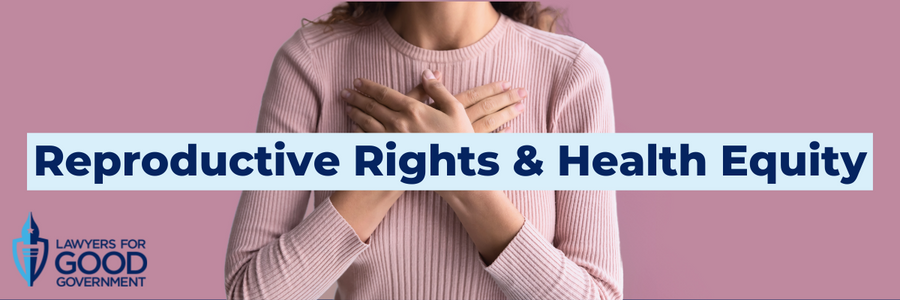
At L4GG, we fervently believe in reproductive rights and health equity, understanding them as cornerstones of individual freedom and human dignity. Our commitment to fighting for bodily autonomy is grounded in the knowledge that all aspects of the fight—from reproductive freedom to gender-affirming healthcare—are inextricably intertwined. We cannot claim success until every person can make autonomous choices about their own body and health, free from government intrusion, coercion, or stigma.
L4GG specializes in working at these intersections in coalition with affected communities and the organizations that serve them. To carry this vision forward, we’ve developed a suite of resources— policy hubs, a bi-weekly digest, and state-level research—that deliver daily legal clarity, timely analysis, and practical tools for advocates, providers, and policymakers.
Explore our resources below:
Reproductive rights and health equity Press
Khadijah Silver, the supervising attorney for civil rights at Lawyers for Good Government, told HuffPost the dissent unfolding right now at the lower courts is a “real act of civil service.”
“They aren’t just saying what’s happening now is wrong. They are spelling out for the sake of the public and posterity what the law is in a way that is so crystally clear and lovingly crafted. And really, it’s written not just for the opposition, not just for people who brought the case, but for the country,” Silver said.
At least one of the cases will likely land in a federal court as a battle of interstate laws, according to Alyssa Morrison, Senior Staff Attorney for Reproductive Justice at Lawyers for Good Government, a nonprofit that mobilizes lawyers to uphold civil and human rights. The result, she thinks, will largely depend on which federal courts the cases end up in. Ultimately, the cases will likely end up in the U.S. Supreme Court.
Trans rights advocate Allison Chapman, a civil rights and health equity fellow at Lawyers for Good Government, criticized the FTC’s approach to the comment period.
“The FTC is clearly on a fishing expedition, looking for responses that will justify its predetermined position,” Chapman told Truthout. “The questions posed are written in a way that leads commenters toward the answers the FTC wants to receive.”
La abogada de derechos civiles Khadijah Silver del grupo Lawyers for Good Government (L4GG) aportó datos contextuales.
“Las personas transgénero constituyen el 1% de la población total en Estados Unidos, pero solo representan el 0,11% de los tiradores masivos”, según datos del Archivo de Violencia Armada.
Silver añadió que estadísticamente, los individuos transgénero son “significativamente menos propensos que la población general a cometer estos crímenes” y en cambio, tienen cuatro veces más probabilidades de ser víctimas de delitos.
On Tuesday, the Eleventh Circuit Court of Appeals overturned a lower court ruling that had found Houston County, Georgia’s health insurance policy— which denied coverage for gender-affirming surgeries—constituted sex discrimination in violation of Title VII of the Civil Rights Act.
“This decision to withhold that care is steeped in animus and distorts the holding in Skrmetti to fit and further a discriminatory agenda, unlawfully expanding Skrmetti to apply to care for adults,” Khadijah Silver, Supervising Attorney of Civil Rights at Lawyers For Good Government, told LGBTQ Nation.
Stroud's complaint comes after the Government Accountability Project on Tuesday said it had, in partnership with the nonprofits Lawyers for Good Government and Stand Up for Science, filed complaints on behalf of FEMA employees who wish to remain anonymous.
In a letter to the OSC, DHS's Office of Inspector General and members of the House and Senate subcommittees on Homeland Security, attorneys for the groups argued the administration's actions "blatantly violate the federal laws protecting whistleblowers."
Lawyers for Good Government launched a new resource hub on Tuesday tracking changes in state policies around access to gender-affirming care and constitutional protections in all 50 states and six territories.
Reproductive rights advocates in New Jersey warn that a Republican governor could restrict access by cutting family planning funding and limiting Medicaid participation—threats that have previously led to clinic closures, higher STI rates, and delayed cancer detection. While state law protects abortion, advocates stress that “rights without access are meaningless.”
A federal judge in Texas dealt a blow to accessing reproductive health care nationally by nullifying a federal privacy rule created to protect abortion seekers and providers from possible criminal inquiries.
“The overturning of this rule, unfortunately, is not unexpected to me, but it is a really important signal to those states that do want to prosecute patients, or do at least want to wield investigation or the threat of investigation as the lever of power, that they are more free to do so,” said Alyssa Morrison, senior staff attorney with Lawyers for Good Government.
In U.S. v. Skrmetti, the Court ruled Tennessee’s limitations on gender-affirming care for minors did not violate the Equal Protection Clause of 14th Amendment, as the plaintiffs had argued. In the opinion, Chief Justice Roberts cited inconclusive medical studies that deem gender-affirming care “an experimental practice” with “highly uncertain” reliability.
As explained in a webinar from Lawyers for Good Government, the plaintiffs relied on the precedent set by Bostock v. Clayton County in 2020, which held that sex discrimination under the Civil Rights Act did include that related to sexual orientation and gender identity.
In the House of Representatives’ recently passed One Big Beautiful Bill Act, something ugly lurks beneath the surface. It is a provision — a single paragraph found about halfway through the bill’s 1,000-plus pages — that could hamstring judges, reduce access to the courts for the average person and reverse a number of the Trump administration’s legal setbacks and defeats.
ICE agents have made over a dozen arrests this week at immigration courts in lower Manhattan. Many migrants find themselves unsure if they should attend their hearings or not. Estuardo Cifuentes, director of programs at Proyecto Corazón, which provides legal aid to immigrants across the country, told Documented that at least two migrant families in New York affected by this week’s arrests have asked them for legal help.
By targeting pro bono programs, Trump’s vengeful executive orders deny real justice to those who need it most but can afford it the least. “Pro bono work is meant to be in service of individuals and communities who otherwise would not be able to afford legal representation,” said Traci Feit Love, founder and executive director of Lawyers for Good Government, a nonprofit group that connects lawyers, law students, and advocates on pro bono projects.
Howell’s 102-page decision presents the facts and legal analysis in a “linear and rational fashion” that makes it “a gift to whoever picks up this case if it’s appealed,” said Khadijah Silver, a civil rights supervising attorney at Lawyers for Good Government who closely followed the case. “The DOGE overreach piece is something that I think will hold up. It was, as Howell says, ultra vires, like nothing we’ve ever seen before. It was an absolute abuse of power that shocks the conscience of anybody who hears about it.”
Policing experts say that discipline is the responsibility of school administrators, not law enforcement. Many California school districts’ contracts for policing services do not prohibit officers from involvement in routine student disciplinary matters, despite the federal government’s guidance that administrators are responsible for handling those issues, an EdSource investigation found.
“It’s basically saying, anytime a kid acts up, you’re free to go violate their civil rights and interrogate them off of the school’s premises and all of that,” Silver said. “It’s unconstitutionally overbroad language that fails to define or delineate any bounds of appropriate police behavior whatsoever.”



















